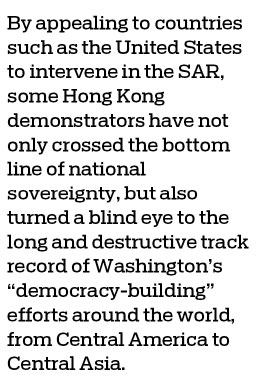Elites, inequality are HK's real problem
Since China regained sovereignty over Hong Kong on July 1, 1997, the city has prospered economically, but festered politically. Now, one of the world's richest cities is engulfed by protests, with demonstrators blocking roads, paralyzing the airport, and at times unleashing violence. Far from a uniquely Chinese problem, however, the current chaos should be viewed as a bellwether for capitalist systems that fail to address inequality.
In times of crisis, it is easy for emotion to overwhelm reason, and for dramatic and deceptive narratives to take root. This tendency is exemplified by media reports that call the unrest a "clash of cultures" symbolizing a broader global struggle between autocracy and democracy, or references to a "fight between two civilizations", as Hong Kong legislator Fernando Cheung put it.

Such narratives often treat "democracy" as synonymous with improved welfare - a characterization that is not borne out by the facts. As political scientist Francis Fukuyama has conceded, centralized systems can deliver economic outcomes that are superior to decentralized, inefficient democratic governments.















